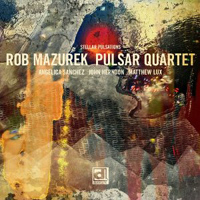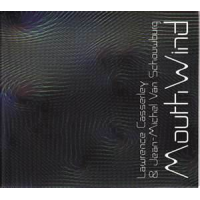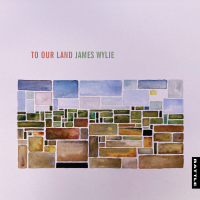Home » Jazz Articles » Record Label Profile » Babel Label: New Songs from the Tower of Sound
Babel Label: New Songs from the Tower of Sound
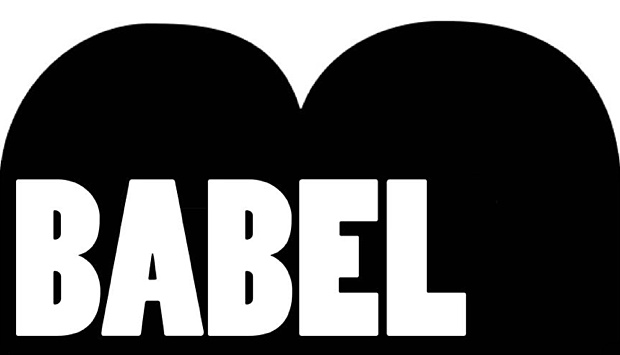
Since Weindling started to document the music he liked on his Babel label, he hasn't looked back. In 2012, Weindling is as busy as ever with a release schedule that keeps on growing, and as the catalog reveals, his taste is exquisite, but eclectic, ranging from roots- music and blues to modern jazz and avant-garde metal.
All About Jazz: When did you form the label and was there any particular reason why it happened?
Oliver Weindling: Babel was formed in 1994. I was working with a few musicians like Billy Jenkins and Iain Ballamy, and was amazed how difficult it was at that time to get good music released. The press at the time only seemed to want to write about musicians when there was a new album. I had particularly got interested in the jazz scene around the time of Loose Tubes, when I met many of the musicians. Things had gradually evolved from my being involved with musicians as a hobby while working as an economist in a bank to my moving beyond that in 1989.
AAJ: What's the story behind the name?
OW: The name Babel is to reflect the Tower and the universal language of music. It has always been a concern of mine that, unlike that tower in the Bible, mine doesn't fall down.
AAJ: You also run a jazz club. Do you find that your activities as a label owner and concert-promoter influence each other or do you try to separate the different identities?
OW: I am one of the people who helps to run the Vortex, though perhaps the most active of the directors! It is structured as a non-profit club. I got involved there when it was being squeezed out from its previous venue and I realized that the philosophy behind the Vortex was similar to mine. Certainly I am influenced by what I hear in the club in terms of where recordings go and I get to know the musicians there.
AAJ: Do you favor a "live" feel on your recordings or do you prefer the sound of the studio? Is there a particular engineer you work with?
OW: As they say, recordings are recordings and live is live. Live recordings are great when they work, and indeed many of the classic recordings that I can think of have been of live concerts. Nevertheless, there are things that can be achieved in a studio of course. A few releases on Babel are based around live recordings, most recently the 2012 album Catatumbo, which is actually a Vortex gig.
There are no preferred studios or engineers, though the scene here in London, which I am involved with, seems to gravitate towards a few studios and engineers. We are driven by what is good value as a studio and is sympathetic. So we even have releases on Babel which are recorded in Abbey Road—such as the new album by Blink, Twice—or just in the Vortex itself as with Catatumbo. It tends to reflect the preferences of the musicians. Overall, the process of recording is quite proactive.
I prefer to produce and work in partnership with the musicians. This is perhaps closer to how things were in the past. We are no longer in an era where a producer or label boss can impose his own views on the musicians. Certainly there are a few in jazz still where this approach is strong, but less than before. I look closer to the openness of some of the labels like Leo or Emanem where the musician has a strong relationship.
AAJ: How do you find your artists and how would you define the aesthetics of the label? As a producer, is there a particular sound you're looking for?
OW: I find the artists through listening, meeting and recommendation. I find that the decision to release an album with anyone is part of a process which may start a long time before. The aesthetics of the label are based on whatever I feel like. My view is that jazz is about an approach rather than a stylistic continuity.
I don't think that it's possible to say that there is a particular sound or approach. There may be at one particular time, and there will be connections through to the past because musicians listen to lots of older recordings or are directed through to them, either through recommendation of their colleagues or through investigation during their studies. So, in the early days, it was a "post Loose Tubes generation." Nowadays, for example, I am releasing a number of young musicians who actually all seemed to study at Guildhall School of Music around the same time.
It's less about the sound than about the attitude and where we are at any time. I prefer to release artists who are located around London, as it's easier for me! Though that too is not a hard and fast rule, since within the catalogue there are all sorts of exceptions. Some singer-songwriters with a bit of jazz in there, such as Paula Rae Gibson, some releases that veer towards heavy metal, such as Bilbao Syndrome, or compilations, such as Now's The Time. There will even soon be a piece reinterpreting Stockhausen's Tierkreis.
I like to feel that all the music is valid and has something to try and tell. Often musicians have a challenge to do something a bit out of the ordinary. In marketing terms that would be the "unique selling point."
I also have a belief that quality music can somehow sell, though it might take time for people to realize it. Unfortunately, for my bank balance, that can be a long time.
AAJ: Babel has done a lot to promote the new wave of British jazz. How would you characterize the British jazz scene and do you see any development over the years since you have been documenting the scene?
OW:The British scene has certainly always had an openness to it, in terms of the influences and attitude. London is a city of 9 million with great multicultural influences. So there is a great ability to respond. There is also a nice balance of respect and irreverence. Of course over the years there have been changes. Nowadays 90% of the musicians have been trained in music colleges, whereas when Babel started that was a minority, since there were hardly any conservatoire courses. Fortunately, though, the courses are run by musicians trained in the real world of the 1980s and are pushing students in a good way. At Middlesex University, for example, the course is run by Loose Tubes alumni such as Chris Batchelor and Stuart Hall. The result from there is that we have musicians like Led Bib over here, or Jason Yarde or Stian Westerhus.
I am pleased that we have perhaps returned to an approach to jazz and music which was stronger at the end of the 1960s. There is a lot less self-consciousness about being branded as "jazz" or "improvised" or indeed any other category. Musicians can balance being themselves with the financial imperatives. I like the fact that some of them are trying out more unusual combinations of instruments or approaches to bring different styles together. There's a great attitude to improvisation in the broadest sense.
I believe that the consistency of Babel and the approach of the Vortex have both contributed to this by encouraging such an approach. Around the Vortex has developed something about the music and attitude, with new venues such as Cafe Oto having an overlapping approach and even blogs started focusing on the area of Dalston and its music.
AAJ: Could you talk about some of the key artists and albums that have been important in terms of the label's development? If you were to choose some highlights, what would they be?
OW: That's a very difficult one. I am certainly proud of many of the releases that have passed through Babel. I am constantly reminded of them all every now and then, when the albums get played in the breaks at the Vortex. I am proud to have released as many albums as I have by Billy Jenkins, who is a father figure to the scene and has an immense imagination and ability. Then there are a few albums which have since gone on to get important status. It delights me when musicians after a few years have pointed to Babel albums as their own personal favorites—such as Julian Arguelles' selection of 2006's Skull View.
I love the albums that I have done with Chris Batchelor and Steve Buckley, such as Life As We Know It and Big Air. Work with the various collectives in London, such as with F- IRE (artists like Polar Bear, Acoustic Ladyland, Tom Arthurs, Finn Peters and Ingrid Laubrock), and with Loop's Outhouse, Fraud and Golden Age of Steam.
I am proud to have had two nominations for the major popular music prize here, the Mercury Prize, for Polar Bear's Held on The Tips of Fingers and Portico Quartet's Knee Deep in the North Sea. I regard that as quite a feat for a label that has basically been a one-man show. Then there is the documenting of a generation that has been a bit lost internationally—Christine Tobin, Partisans and Phil Robson.
Huw Warren is also a musician who has done great albums on Babel, where I always hear something new every time I put the albums on. Now, I am working with a range of musicians, from some doing their first albums, such as Bruno Heinen or Dan Messore through to bands like The Gannets, Vole and Partisans. When I travel to festivals and so on, I am amazed and proud of the number of musicians playing there who are keen on what the Vortex is about.
AAJ: What is your take on the new technology? Do you see it as an opportunity or a hindrance? Could you imagine Babel being a label that only released downloads or is it important to you that there is a physical product?
OW: The good news is that one can be all things to all people. I find it liberating that the power of the traditional shop chains has been lost. So we can go back and release CDs, downloads and even vinyl. Covers and packaging can be more or less lavish.
As long as there is interest in physical products as means of dissemination of the music, I certainly shall continue to release CDs and similar. I shall be sorry when the day comes that we can't give something material to friends, where they respond to the content, and that includes books. But there will be more and more download only releases, I am sure.
AAJ: What is the label's approach to packaging and design? You have worked with visual artist Gee Vaucher. Is there a particular visual style you aim for?
OW: The packaging should be reasonably priced. So we now have found out that CD packs can look more like gatefolds. The artists tend to work through the designers they like best and who properly reflect the music. We started working with Gee because of a connection with Christine Tobin. But subsequently this has meant that I have grown close connections with the Crass scene, such as poet Penny Rimbaud.
AAJ: Could you say something about your release schedule and some of your up-coming projects? What kind of music are you excited about at the moment?
OW: The Babel release schedule has picked up dramatically over the past few months. It is probably due to the lack of other outlets for much music to be released in this country, but also because there are a number of projects that excite me—and hence Babel. They include: Dice Factory (Tomas Challenger, George Fogle, Tom Farmer, Jon Scott); Vole (Roland Ramanan, Roberto Sassi, Javier Carmona), Rae Forrest Project (Paula Rae Gibson, Mike Flynn); Now's The Time Vol. 3 (compilation of French/Luxembourg jazz by DJ Kevin Le Gendre); Barbacana (Kit Downes, Sylvain Darrifourcq, James Allsopp, Adrien Dennefeld); Tierkreis (reworking of Stockhausen's work by Bruno Heinen); Rachel Musson, Liam Noble, Mark Sanders' trio; Moss Freed Project; and Eye Of A Blue Dog (Rory Simmons, Terje Evensen, Elizabeth Nygaard).
To an extent, they show a consolidation of some of the music that we have been releasing over the past years. There's further work with musicians whom I have worked with before, but also a few that I have been aware of for a while, such as Paula Rae Gibson, Bruno Heine. I like the fact that many are part of a total desire to get music better known through playing as well as recording. We have moved away from the "project"/commission concept, whereby a period of rehearsal is followed by one or two concerts at festivals and then that's virtually it. Though some have great concepts behind them, such as Tierkreis or Moss Freed, where the guitarist has commissioned short writings stimulated by the music.
I also like that there are a few more albums where musicians are sucking in collaborators based abroad—though they might in fact have also studied or lived here for a few years or who feel an affinity to the scene here.
There is a great desire now over here for musicians to move more seamlessly between styles which might have been more separated, like composed versus improvised versus pop/rock. Musicians are getting known for playing outside what they are usually associated with. That happened with my releases by Amit Chaudhuri, who is known as a writer, or Gannets, where Fyfe Dangerfield is known as a member of the art pop group Guillemots. Liam Noble is known here more as a pianist in the purer jazz scene, and yet he is now the favored London pianist for Mary Halvorson, Ingrid Laubrock and Peter Evans for their free improv stuff. Perhaps it's to say that I like music involving improvisation and challenge.
There's not only challenge and improvisation involved when it comes to releases on Babel, but certainly also pleasure, and selecting a bunch out of the many excellent releases is a tough task, but here follows a sample of some of the treasures found in Oliver Weindling's tower of sound.
 Billy Jenkins
Billy Jenkins When the Crowds Have Gone
2005
On his website, eclectic bluesman Billy Jenkins describes himself as: "Guitarist, composer, bandleader, performer, humanist and funeral officiant." This unorthodox description is actually a quite apt characterization of a man who has been notoriously hard to pin down. Jenkins is a true original, and in that way he fits perfectly with Babel's open-minded approach to music, and it's no coincidence that the two have enjoyed a long-standing musical relationship, spanning eight albums that are as quirky and spellbinding as the man himself.
Jenkins' career on Babel coincided with the label's own beginning in 1994. At that time, he released his album Entertainment USA, an ambitious concept-album that took different American personalities like Elvis Presley and Johnny Cash as inspiration. Jenkins uses an A- list band, The Voice of God Collective, with several Babel alumni, like saxophonist Mark Lockheart, pianist Huw Warren and bassist Steve Watts, and together they create a countrified funky stew of orchestral sounds that constitutes Jenkins' own idiosyncratic journey into the American heartland.
Entertainment USA uses a large ensemble, complete with choir and several horns, but When the Crowds Have Gone (Babel, 2005) is a more intimate affair with Jenkins only accompanied by bassist Watts and violinist Dylan Bates. Here, his ability as a guitarist and singer/songwriter really comes to the fore on a crisp sounding recording where the bluesman reveals his tales of poverty, loss and loneliness. It's all wrapped in a warm humor that is reflected in a song about the annoying sound of a pizza delivery, as well as in titles such as "Sitting on the Dock of the Ebay."
With his instrumental prowess, deep sense of tradition, experimentalism and quirky humor, Jenkins sometimes comes across like a singing version of John Fahey, but he is really a man who is entirely his own, and it's no bad start to experience him close-up on this wonderful release.
 Steve Arguelles
Steve Arguelles Circuit
2006
The influence from blues, country and Cajun music is most strongly felt on releases by Billy Jenkins and a little gem in the Babel catalog, Disorder On The Border (Babel, 2006), where the vocal trio of fiddler Charlie Hart, guitarist Gary Rickard and accordionist Geraint Watkins play their own authentic version of old- time Americana. But the influence from roots-music is also apparent in more subtle ways; for instance, the weeping pedal steel and lush violin work of Stuart Hall sublimely colors the music on drummer Steve Arguelles' album Circuit (Babel, 2006).
The opener, "The Wind-Up," is a grooving piece where bassist Steve Watts together with Arguelles lay down a funky rhythm that propels the tune forward, while brother and saxophonist Julian Arguelles plays some enchanting melodic lines in tandem with Hall and accordionist Huw Warren, who adds just the right amount of Cajun spice to the tune. Warren steps into the spotlight on the ballad "Votation" where he plays a strong intro before the rest of the band enters, with Julian Arguelles delivering a well-rounded solo, touching on all aspects of his instrument, from smooth, long lines to shrill outbursts.
Throughout, Steve Arguelles shows himself as an accomplished leader, who is able to give room for all the players. While sophisticated in his playing, he is in no way domineering, and perhaps his influence as a drummer is most poignantly felt in the careful programming of the album where a wide rhythmical canvas comes into play, ranging from waltzes and ballads to mid-tempo grooves. However, true to the spirit of Americana, the most domineering forms are the slower, ballad-like songs where the dusty rhythms are blown into shape on what amounts to a delicately cinematic release.
 Julian Arguelles
Julian Arguelles Scapes
2001
Julian Arguelles has also recorded as a leader for Babel and while his recording with an octet, Skull View (Babel, 2006), shows him as a composer and leader in a larger setting, with plenty of room for sophisticated swing and highly energetic playing, his duo recording with brother Steve on Soundscapes is naturally a more pared- down affair. What the two records have in common is the composition "Las Ramblas," which is played in two notably different versions.
On Skull View the composition is introduced by Steve Watts' understated bass before the melody is blown through the aerial charts of the orchestra and guitarist Mike Walker plays a distinctive solo that polyphonically plays with the theme and soulfully bends the notes of the strings. It is a painting of sound where the drums of Martin France mainly function as coloration.
On Scapes the composition is divided into two parts: "Las Ramblas I" and "Las Ramblas II." Paradoxically, there's more rhythmical energy on display on "Las Ramblas I" than on the version for octet. Steve Arguelles' steady handclaps propels a rhythm over which the saxophone plays a web of melodies and later it evolves into to the theme on "Las Ramblas II," where the saxophonist acts as both accompanist and soloist, with the saxophone played in two layers.
Both of his releases on Babel show Julian Arguelles as a highly skilled improviser and composer whose sense of detail covers the dense structures of a large group and the possibility and space of the duo. But what is most fascinating is to hear how he is able to turn the two worlds around on "Las Ramblas." The minimal setting of the duo is enhanced by complex layers of horn and the larger canvas of the octet is explored into detail, with the boisterous rhythms residing into the background. The musical forms truly come alive and are seen anew in the hands of Arguelles.
 Tom Arthurs and Richard Fairhurst
Tom Arthurs and Richard Fairhurst Postcards From Pushkin
2012
The brothers Arguelles have a unique sense of musical communication. Another telepathic duo on Babel consists of trumpeter Tom Arthurs and pianist Richard Fairhurst. One of the compositions on Arthur's album Centripede (Babel, 2003) is called "Pollock" and like the painter Jackson Pollock, Arthurs could be called an abstract expressionist. While mentioning words like "abstract" and "expressionism" perhaps will scare some listeners away, Arthurs has a strong lyrical bent that makes his playing accessible— even to those not normally interested in experimental music.
Arthurs' lyricism thrives in the partnership with pianist Richard Fairhurst, whose crystalline chords and sense of space are perfectly suited for the warm tones of Arthurs' trumpet and flugelhorn.
The duo has created their own tone-poems on Mesmer (Babel, 2007), but the poetry of the music becomes even more tangible on Postcards From Pushkin (Babel, 2012). Here, the duo uses the poetry of Alexander Pushkin (1799-1837) as a stepping stone to artworks of sound.
On compositions like "Silence" and "Darkness," the two exquisitely explore the timbre of the instruments, playing in the space between silence and sound, and letting the notes form themselves out of the air like illuminating letters written on a blank page. Fairhurst pauses, moves the tangents between harmony and dissonance, creating a lyrical mood that never becomes sentimental, while Arthurs' flugelhorn cuts like lines of light through the darkness of the melancholy chords.
Poetry is often connected with the romantic idea of a singular artist, but while Postcards From Pushkin is based on the works of a romantic poet, there isn't anything romantic about the aesthetics of the record. The work isn't the result of one, but two brilliant minds, and the musical postcards they write are certainly worth receiving.
 Penny Rimbaud / Crass Aganda
Penny Rimbaud / Crass Aganda How?
2004
Poetry was an indirect source of inspiration on Postcards From Pushkin in a process where words became music. Somehow, this process is turned upside down on poet Penny Rimbaud's How?, where improvised music helps to bring about poetry—all in the spirit of beat poet Allen Ginsberg (1926-1997) whose famous poem "Howl" is hinted at in the title.
Almost all of the content on the album, six tracks in all, is completely improvised, but the opener is a tender a cappella version of the standard "Brother Can You Spare Me a Dime?" sung beautifully by Christine Tobin, who is accompanied by bowed bass and moaning saxophone at the end of the tune. The core of the album is a poem by Penny Rimbaud where he riffs on the rhythm and words of Ginsberg's "Howl." In the midst of honking saxophones, rolling drums and groovy bass patterns, Rimbaud chants his poetic visions, clearly inspired by the players around him.
The mood is at times hypnotic, other times energetic. The force of life is conveyed in a stream of words and sounds. It works because there is a structure, which comes from melodies and rhythms that pop out of the air like flowers from the ground, but Ginsberg's own diction also haunts Rimbaud like a friendly ghost. The result is a steaming session of jazz poetry. Not poetry with jazz or jazz with poetry. This is a documentation of a concert that Ginsberg and his cohorts almost certainly would have enjoyed, screaming: "Go! Go! Go!" out into the blue city night.
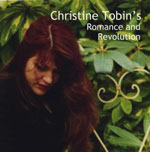 Christine Tobin
Christine Tobin Romance and Revolution
2004
Irish-born singer Christine Tobin appears as a guest on How?, but she is in fact one of the most prominent artists on the label and has released a string of seven magnificent albums. Blessed with a beautiful and nuanced voice, capable of expressing a wide range of emotions, Tobin interprets her own and others' songs with a natural intensity, far from the showy vocal pyrotechnics of some singers.
While every Tobin album is worth exploring, Romance and Revolution is a particularly good entry because it mixes the singer's originals with a superb choice of covers, including Brian Wilson's "God Only Knows" and Bob Dylan's "Shelter From The Storm." The former is interpreted as a slow ballad, with guitarist Phil Robson's mournful twang and Tobin's smoky voice in perfect tandem. The latter, however, receives a radical makeover and is transformed into a groovy piece of soul-jazz, with bassist Dave Whitford and percussionist Thebe Lipere anchoring the rhythm.
Tobin knows how to groove with her voice, but as composer, singer and interpreter, she is at heart a lyrical artist and this also underlined on Sailing to Byzantium (Trail Belle, 2012) that is dedicated entirely to the poetry of Irish poet W.B. Yeats (1865- 1939). On Romance and Revolution she translates the poetry of Paul Muldoon into song, giving "Horses" all the airy and pastoral elegance it needs to create a sweet sense of musical magic. However, as fragile as she can be, Tobin can also be down-to-earth and gritty when she sings the blues with a grainy voice, as she does on "Young Woman's Blues."
Romance and Revolution is a well-rounded portrait of one of the most exciting and original singers that the British jazz scene can offer, and her work is so consistent that anyone who dives into her rich catalog will be rewarded.
 Phil Robson
Phil Robson Impish
2006
Guitarist Phil Robson has graced many of Christine Tobin's albums, but he is also a member of the vibrant post- bop group Partisans, whose tight balance between tradition and experiment can be experienced on Sourpuss (Babel, 2000 ), Max (Babel, 2006) and By Proxy (Babel, 2009). Besides that, he is also a leader in his own right and has released three albums on Babel, among them, Six Strings & the Beat (Babel, 2007), which finds him in the company of a string quartet. Impish (Babel, 2006) is a bit more conventional in its line- up—featuring guitar, bass, drums and piano—but it isn't less intriguing.
The album changes between the format of trio and quartet and the opener, "Lapdog," finds Robson in heated interplay with drummer Asaf Sirkis and bassist Dave Whitford. Sirkis is explosive as he hits the cymbals and toms and makes them roar in the midst of Robson's breakneck riffs. Just as thing are cooking, the trio slows completely down on "Iris," Robson changing to acoustic guitar and playing a pretty melody. Then pianist John Taylor enters on "Wandy's Place (For Hector)" and, surprisingly, adds a rollicking Latin touch to his trademark lyricism.
While Christine Tobin joins in on the guitarist's other releases, she is physically absent on Impish, but she is nevertheless present in spirit with the ballad "You Draw the Line," which receives a deep interpretation from the group, with Taylor gently exploring lyrical motifs while Robson's hushed tones on the acoustic guitar adds to the warmth and intimacy of the music.
As a player, Phil Robson is immensely versatile and the guitarists that have inspired him are a testimony to this: Barney Kessel, Kurt Rosenwinkel, Kevin Eubanks, Bill Frisell, Pat Martino, John Scofield, Peter Bernstein and Kenny Burrell. In the midst of all these influences, Phil Robson has found his own voice and is a strong presence on Babel and the British jazz scene.
 Huw Warren
Huw Warren Infinite Riches In A Little Room
2001
There are many charismatic musicians on the Babel label, but one of the most original is accordionist and pianist Huw Warren, who pops up on records by Billy Jenkins, Christine Tobin and Steve Arguelles, but Warren is as fascinating alone as he is in the company of others. This is evident on listening to his solo piano album Infinite Riches In A Little Room (Babel, 2001), where his encyclopedic knowledge of music shines through. Warren is just as much at home with classical music as he is with avant-garde jazz and bop, Brazilian pop and electronic composition and all his influences melt into a singular expression that glows when he sits alone in front of the piano and explores its infinite riches.
Half of the tracks on the album are inspired by John Dowland's composition "Lachrymae," but never frozen in a timeframe. Instead, Warren weaves threads of past and present music together, uses well- known snippets and transforms them into his own language, while still being aware of the traditions on which he rests. The sound of the piano is never dull. It becomes a wonderful box whose strings and wood can be tapped, plugged, caressed and modified electronically to make familiar and estranged sounds. Warren is even able to make the instrument dance, as he does on Hermeto Pascoal's "Xibaba," which is as bright and poppy as it is avant- garde. Here, he employs a strange brew of prepared piano sounds and sunny melody.
Simply said, Infinite Riches In A Little Room is the sound of experiments and creativity, but it isn't introverted navel-gazing. While constantly seeking new forms and sounds, Warren nevertheless keeps track of the forms and lets them metamorphose and not muddle, and—more important—there is real emotional engagement to be found on this fresh take on the art of solo piano.
 Polar Bear
Polar Bear Dim Lit
2004
One of Huw Warren's many collaborators is saxophonist Mark Lockheart, with whom he made the album Duw A Wyr (Babel, 2005), where they gave superb backing to Welsh singer Lleuwan Steffan. As some of the artists on Babel, including Julian and Steve Arguelles, Lockheart had been a member of the experimental big band, Loose Tubes.
Another important artistic collective that has contributed a lot of players to the records on Babel is the F-IRE Collective (Fellowship for Integrated Rhythmic Expression), whose aesthetic ideas have challenged the conservative notion of jazz. Bassist Tom Herbert, drummer Sebastian Rochford and saxophonist Pete Wareham, together with Lockheart, formed the first incarnation of Polar Bear, which recorded Dim Lit.
On its second album on Babel, Held On The Tips Of Fingers (Babel, 2005), the band delves into electronics and merges it with their complex compositions, but Dim Lit already has many of the core virtues of the group: the postmodern mix of genres united in tunes that are still distinctively jazzy, and it thrives on the balance between cool, melodic grooves and energetic bursts of improvisation.
An even more radical deconstruction of genres can be found in Rochford's other band Acoustic Ladyland, whose two albums on Babel Camouflage and Last Chance Disco are both delightfully anarchistic. You could say that if Rochford's two bands were persons, Polar Bear would be the cool cat in the pin- striped suit while Acoustic Ladyland would be the weird cousin with his hair on fire.
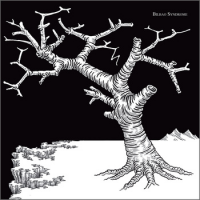 Bilbao Syndrome
Bilbao Syndrome I-VI
2012
Besides F-IRE, another collective that has found its way into the ranks of Babel is LIMA (Leeds Improvised Music Association). TrioVD and Bilbao Syndrome are both bands associated with LIMA and if the music of Polar Bear and Acoustic Ladyland is a gentle pad on the dusty shoulders of jazz, then these two bands represent an aural slap in the face that definitely will scare some listeners away.
Both TrioVD and Bilbao Syndrome take important cues from progressive rock, electronic music and free jazz, but the most strongly felt presence is heavy metal. Bilbao Syndrome is more likely to find fans in the metal camp than with jazz people, but it's too easy to dismiss the group as a heavy metal gimmick. Instead, it really caters to people that don't care about genres, but want to be challenged aesthetically.
Singer Andrew Plummer moans, growls, screams and sighs through a series of compositions (numbered I-V). The music is both ugly and grand in its uncompromising abyss of sound, and is also rhythmically complex.
The cover depicts a bare tree standing in the mountains, and the colors are only black and white. In a way the music is just as bleak, but it isn't primitive. More than anything, this is music that demonstrates the wide range of Babel. It is indeed rare to find a jazz label that welcomes the sounds of old-time music and blues and avant- garde metal, and Babel is a treasure in the landscape of jazz, a place where there is room for new sounds and songs.
Tracks and Personnel
When the Crowds Have Gone
Tracks: In My Bones; I Like Rain; Get the Poison Out; If I Were A Lollipop Man; The Tide Is Out; Blues Is Calling Me; When Money's Really Tight; Come Round And See Me; Sitting On The Dock Of The Ebay; Trouble In Mind; Everything's Too Fast; This Room; Cry Your Eyes Till They're Red.
Personnel: Billy Jenkins: guitar, vocal; Steven Watts: double bass; Dylan Bates: violin.
Circuit
Tracks: The Windup; Penkiss; Votation; Backwater Babble; Explosions; Circuit; Caraqueb; The Peacocks; Duckin'; Hati, Hati; Pigshead Copanitsa (aka poisoned umbrella dance).
Personnel: Steve Arguelles: drums; Julian Arguelles: alto and baritone saxophone; Stuart Hall: violin, guitar, pedal steel; Huw Warren: accordion; Steve Watts: double bass.
Scapes
Tracks: Sectioned; It's An Ant Life; Intro To The 3J's; The 3J's; First Wessex; Fat Cats; Fasa; The Tide; Louder Than Words; Intro To Hix; The Peaks; Cookiegate; 13-Cd 318; The Owl; Las Ramblas Part I; Las Ramblas Part 2.
Personnel: Julian Arguelles: saxophone, bass clarinet, flutes, recorders, keyboards & handclaps; Steve Arguelles: percussion and drums.
Postcards From Pushkin
Tracks: The Flirt; Given Up; Silence; Solo; The Judge; Darkness; Half- Milord.
Personnel: Tom Arthurs: flugelhorn; Richard Fairhurst: piano.
How?
Tracks: Brother Can You Spare Me A Dime?; How. Part One; How. Part Two; How. Part Three; How. Part Four; Outro.
Personnel: Christine Tobin: voice; Penny Rimbaud: voice; Louise Elliot: tenor saxophone, flute; Ed Jones: tenor saxophone, bass- clarinet; Mika Myllari: trumpet; Davide Mantovani: upright bass, Paul Clavis: drums.
Romance and Revolution
Track Listing: Horses; God Only Knows; Black and Blue; He's Not Anyone; Shelter from the Storm; Go Down Easy; Muse of the Blues; Young Woman's Blues; Brandy and Scars; Can't Help Lovin' that Man; My Boat's Ready; Fragile Dance.
Personnel: Christine Tobin: voice, piano; Phil Robson: guitar; Dave Whitford: double bass; Thebe Lipere: percussion; Steve Arguelles: drums.
Impish
Tracks: Lapdog; Iris; Wandy's Place (For Hector); Gone Fishing; Reptilian; Impish; Chomping; You Draw the Line; Bug Eyes.
Personnel: Phil Robson: guitar, saz; Dave Whitford: double bass; Asaf Sirkis: drums; John Taylor: piano.
Infinite Riches In A Little Room
Tracks: Mash; Moose The Mooche; Lachryme—Teares; Lachryme—Doth Promise; Lachryme—Unfit Guests; Lachryme —Musicke Weeps; Lachryme— She Alwayes; Lachryme—Showers Of Harmonie; Lachryme—Bee Metamorphosed; Lachryme—True Tears; Xibaba; Quiet (r) Riot; All Dancing; Infinite Riches; Loopy; Like Someone In Love.
Personnel: Huw Warren: piano, keyboards, samples.
Dim Lit
Tracks: Heavy Paws on the Purple Floor; Not Here, Not Near; Eve's Apple; Polar Bear Standing and Ready; Urban Kilt; Snow; Underneath You Can See Too Much; The Shapes in the Clouds Aren't Always Happy; New Dark Park; Wild Horses.
Personnel: Sebastian Rochford: drums; Tom Herbert: bass; Mark Lockheart: tenor saxophone; Pete Wareham: tenor saxophone; Julia Biel: vocal.
I-VI
Tracks: I; II; III; IV; VI; V.
Personnel: Matthew Bourne: keyboards; Chris Sharkey: guitar; Chris Bussey: drums; Colin Sutton: bass; Andrew Plummer: vocal.
Photo Credit
Courtesy of Oliver Weindling
Tags
Record Label Profiles
Jakob Baekgaard
United Kingdom
London
Ronnie Scott's Jazz Club
The Vortex
Babel Label
Loose Tubes
Billy Jenkins
Iain Ballamy
Chris Batchelor
Jason Yarde
Stian Westerhus
Polar Bear
Acoustic Ladyland
Tom Arthurs
Finn Peters
Ingrid Laubrock
Outhouse
Christine Tobin
Partisans
Phil Robson
Huw Warren
Bruno Heinen
Vole
Tom Challenger
Tom Farmer
Jon Scott
Roland Ramanan
Javier Carmona
Kit Downes
Adrien Dennefeld
Liam Noble
Mark Sanders
Rory Simmons
Terje Evensen
Amit Chaudhuri
Mary Halvorson
Ingrid Laubrock
Peter Evans
Mark Lockheart
Steve Watts
Dylan Bates
Steve Argüelles
Julian Arguelles
Martin France
Richard Fairhurst
christine tobin
Phil Robson
Dave Whitford
Asaf Sirkis
John Taylor
Barney Kessel
Kurt Rosenwinkel
Kevin Eubanks
Bill Frisell
Pat Martino
John Scofield
Peter Bernstein
Kenny Burrell
Hermeto Pascoal
Tom Herbert
Sebastian Rochford
Pete Wareham
PREVIOUS / NEXT
Support All About Jazz
 All About Jazz has been a pillar of jazz since 1995, championing it as an art form and, more importantly, supporting the musicians who make it. Our enduring commitment has made "AAJ" one of the most culturally important websites of its kind, read by hundreds of thousands of fans, musicians and industry figures every month.
All About Jazz has been a pillar of jazz since 1995, championing it as an art form and, more importantly, supporting the musicians who make it. Our enduring commitment has made "AAJ" one of the most culturally important websites of its kind, read by hundreds of thousands of fans, musicians and industry figures every month.


